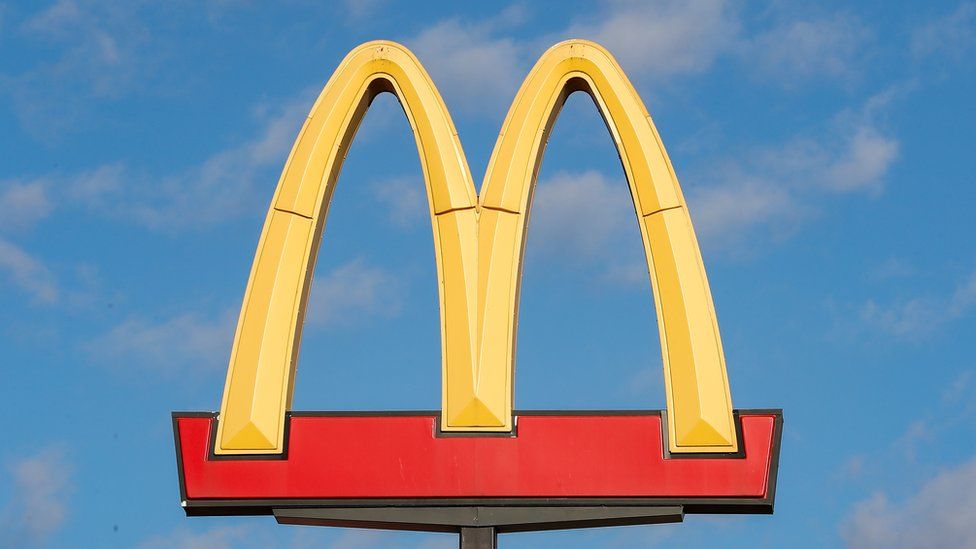McDonald's faces up to two sex abuse claims a week
- Published

McDonald's UK boss has admitted the fast-food chain is receiving between one or two sexual harassment claims a week following a BBC investigation.
Alistair Macrow told MPs it had received more than 400 complaints from workers since July, when the BBC uncovered hundreds of allegations.
He said 18 people had since been sacked but he did not know how many complaints had been referred to the police.
The BBC found that workers as young as 17 were being groped and harassed.
They said they experienced a toxic workplace culture at McDonald's where claims of sexual assault, racism and bullying were not taken seriously.
Mr Macrow told the Business and Trade Select Committee on Tuesday that McDonald's UK had received 407 employee complaints of a varying nature since July.
Following the BBC's initial report in the summer, Mr Macrow set up an investigation handling unit to deal with complaints.
Of the 157 complaints that have been investigated, Mr Macrow said 17 complaints were about sexual harassment and had led to disciplinary action. He added that nine related to bullying and one was about racial harassment.
In relation to the outstanding cases yet to be probed, 27 complaints are about sexual harassment, he added.
Mr Macrow said: "To give you a picture of what we see on an ongoing basis, we typically would see between 20 to 25 contacts per week, of which one or two would be sexual harassment."
The fast-food chain is one of the biggest private sector employers in the UK, employing more than 170,000 people.
It has one of the UK's youngest workforces, with three quarters of staff aged 16 to 25 and, for many, it is their first job.
In total, it has 1,450 restaurants. According to Mr Macrow, 89% of its branches in the UK are operated by franchisees. But he admitted that no franchisees had yet lost their contracts due to claims of harassment and abuse.
'Protecting workers'
Liam Byrne, chair of the Business and Trade Committee, asked the McDonald's boss if "profit was more important than protecting workers".
Mr Macrow said it was "absolutely not the case".
"The most important thing in our business is our people. We do everything we can to look after our people," he added.
More than 200 current and former McDonald's workers spoke to the BBC about their experience of working at the fast-food chain, with a number claiming they were subject to sexual abuse and harassment by colleagues and superiors.
Among those was Ed and Emily, who both attended the committee hearing on Tuesday. They both said they did not feel reassured by what Mr Macrow said.
Emily was 17 when she got her first post-college job at a McDonald's in north west England. She was groped and hit on the bottom by her manager. She reported him on the company's staff support service but never received a reply.
She believes that Mr Macrow and McDonald's does put profit before people.
"When I was working at McDonald's it was very clear to me that I was easily replaceable," she told the BBC. "I think that it's definitely true that he has put profit before the people because as soon as I brought forth an allegation, I was fired.
"So it's easier for them to just fire me than actually look into these allegations."
Mr Macrow said the testimony from workers had been "truly horrific" and "very difficult to hear".
He admitted that some of the complaints reported to McDonald's independent handling unit "stretch back as far as the 1980s", adding: "Clearly those more recent we were able to investigate more fully."
Ed was 16 when he started working in McDonald's at the beginning of this year. He said a senior manager made sexual innuendos and repeatedly asked him for sex. He raised it with a senior manager, but nothing was done.
Eventually, after months of harassment, he quit in April.
He said that hearing that more than 400 complaints had made to McDonald's in the past four months "was quite shocking and upsetting and I think is damning evidence against McDonald's that they need to change".
But he added: "What you should be thinking about is how many people have been unable to make those complaints, who've been scared to complain, particularly to managers who will be controlling their hours.
"Who else is currently being harassed or going through something and is unable to come forward?"
Ian Hodson, national president at the Bakers, Food and Allied Workers Union, also appeared before MPs and said some stories that it had been told by McDonald's employees were "absolutely horrific".
"And it shouldn't happen," he said. "In the 21st century, in the UK, it shouldn't happen."
Mr Hodson added: "When a global corporation, [one of the] biggest employers in the world that makes billions and billions of pounds, can't protect its workforce it's awful. It should be leading and be an example for others - but they're not."
Have you been affected by issues covered in this story? You can share your experiences by emailing [email protected].
Please include a contact number if you are willing to speak to a BBC journalist. You can also get in touch in the following ways:
- WhatsApp: +44 7756 165803
- Tweet: @BBC_HaveYourSay
- Upload pictures or video
- Please read our terms & conditions and privacy policy
If you are reading this page and can't see the form you will need to visit the mobile version of the BBC website to submit your question or comment or you can email us at [email protected]. Please include your name, age and location with any submission.
Related Topics
- Published9 November 2023
- Published19 July 2023
- Published18 July 2023